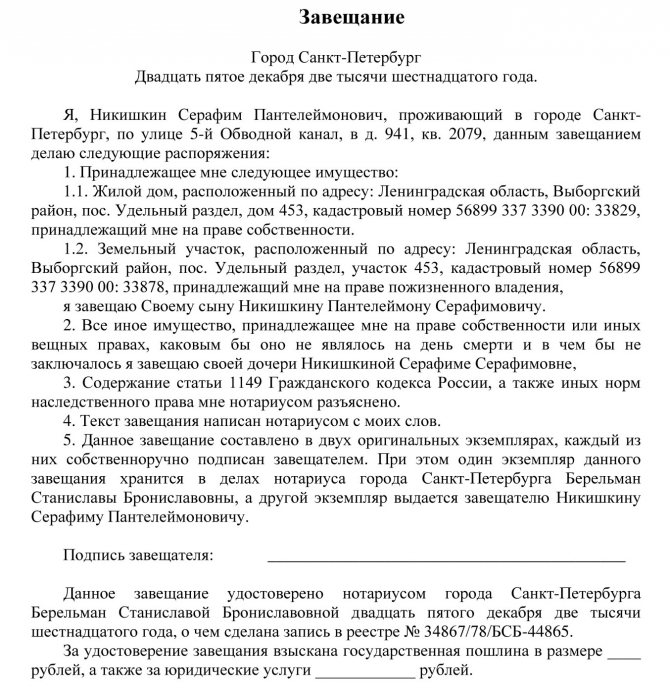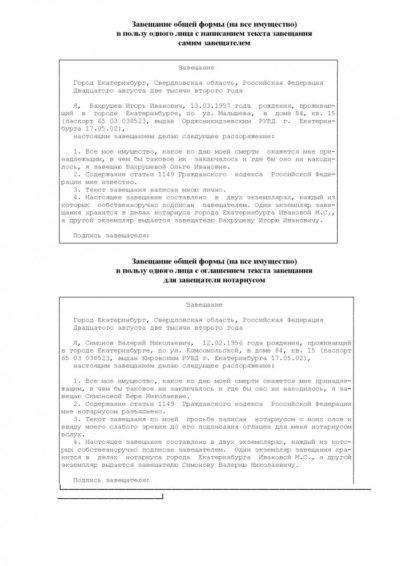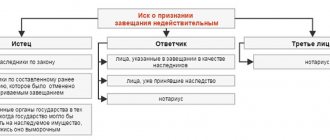Basic information about a will
A will refers to documents confirming a property transaction.
It is drawn up during the lifetime of a citizen who determines in advance the fate of the property he has acquired, determines the heirs and their share. The persons receiving property according to the drawn up document can be not only relatives, but also strangers.
The document is certified by a notary, like any other legal paper. It comes into force only after the death of the originator. Moreover, after drawing it up, you can cancel it by drawing up a new one or writing an application for cancellation. Please note that in the end, the last document drawn up and certified comes into force.
List of required documents
In order to make a will you need to provide documents .
- First of all, it is a passport of a citizen of the Russian Federation.
- If you are making a will with a notary, he will require a medical certificate from you, which will prove that you are of sound mind and memory.
- Since you are going to bequeath any property, you must provide proof that it is yours. For example, to transfer ownership of an apartment, it is necessary to attach a certificate of ownership, as well as a purchase and sale agreement or donation agreement for the apartment.
- Additionally, you may need papers that will support your right as the owner to bequeath other property.
Making a will
To recognize the document as valid, the following requirements must be met:
- The document is drawn up exclusively in writing.
- After preparation, the paper is certified by a notary. In some situations, certification by third parties is allowed, but only if the citizen was in mortal danger.
- The paper must indicate the place and date when the will was certified. Without a date, a document is considered invalid.
- The testator is obliged to draw up the document personally.
The text should contain the following points:
- Full name testator.
- Date of Birth.
- Indication of the address where the originator is registered.
- Passport details.
- Information about inherited property. It is necessary to indicate the characteristics of the property. So, for example, if this is an apartment - its address, if a plot of land - its size, if a car - its make, model and license plates.
- Heirs data.
- The date of the will.
Here is an example of an application form:
Below you can see the completed sample will:

What should you think about before registration?
Before you undertake the steps of making a will, you need to prepare your estate for this purpose. If you are going to submit documents for real estate, you must be 100% sure that it can be included in the transaction. Be sure to pay off all debts and remove encumbrances from him.
You must be the rightful owner, and bequeath to your heirs the property that has no encumbrance. Think about this in advance.
Next, we'll tell you more about writing a document.
Who cannot be excluded from a will?
Despite the fact that the owner of the property has every right to indicate any citizens as heirs, according to the law, there is a list of persons who in any case receive a share of the inheritance.
Even if they were not mentioned in the document drawn up, their right to inheritance is taken into account when distributing the inheritance. These include:
- Children of the testator under 18 years of age.
- Parents or guardians recognized as incapacitated.
- Citizens who were dependent on the testator for at least a year.
When drawing up the paper, it is necessary to take this nuance into account and be sure to indicate these persons and their share when drawing up the inheritance. If this nuance is not observed, the will may be challenged.
Step-by-step instructions: how to write correctly?
Now we’ll tell you how to write a will correctly.
Form
In accordance with Article 1124 of the Civil Code of the Russian Federation, a will can be made in simple written form and also certified. An oral form of a will is not allowed, since after the death of the testator, it is unlikely that anyone will be able to convey his words the way he would like to do it .
There is no single form in which a will is drawn up. Although you can find many samples on the Internet, it is up to you to formulate what your ideal document will look like. You can be guided by existing samples, or you can create your own unique form. The will is drawn up in any form.
Content
It is important to pay special attention to the content of the document. The absence of any important information may invalidate the will.
The will must contain the following information, the completion of which is an important point.
- Initials of the person who is the testator.
- Initials of the heir.
- Indicate the place of registration where both the testator and the recipient of the property are registered.
- It is necessary to describe the property that is transferred as an inheritance. The description is made in accordance with documents that confirm ownership, as well as other available technical papers.
- It is necessary to provide a clear description of the property so that the person who is the heir or recipient has the opportunity to imagine what will be given to him.
- If there are conditions that must be met to receive an inheritance, they must also be stated.
- If documents are attached on letterhead or paper, they must be listed.
- Signatures are placed and the date is indicated.
Signature
At the very end of the will there must be a signature of the person, and there must be a transcript of it. The testator must sign.
In a situation where a given person cannot sign due to his physical characteristics, the will can be signed by a trustee, or a notary certifies the fact that the will was drawn up without a signature.
These recommendations must be followed in order to complete such an important document.
Registration procedure
Registration involves two main stages:
- Direct composition of the text. The testator can draw it up either independently or by seeking help from a specialist.
- Certification of the drawn up document by a notary or other person authorized to do so.
Persons who can certify a will if it is impossible to contact a notary include: ship captains, chief doctors, heads of prisons and military units, heads of expeditions. Certification of the paper in these cases is carried out in the presence of witnesses.
Certification procedure
Next, a certificate is issued. So let's see how this happens.
Notarization procedure
The requirement to certify a will is contained in the law. It must take place in the same place where it is drawn up, namely at the notary. If due to some circumstances it is not possible to have the will certified by a notary, then you can ask the person who is your manager to do so.
Certification implies the affixing of a seal, signature of a notary, as well as making a record of the preparation of these documents in a special register.
Certificate without a notary
If certification occurs without a notary, then the will can be certified by your head of the organization, expedition, military commander, chief physician, and so on. The law allows this if there is no physical opportunity to contact a notary.
Read about registering a will with and without a notary here.
Drawing up a document in emergency circumstances
In emergency circumstances, the rule described in the paragraphs above applies. For example, being on an expedition or in the service implies that this document is certified not by a notary, but by the leader of the expedition, or a military commander.
Certification with the help of officials
When certifying a will, the official must have a seal, as well as the right to sign documents. Therefore, if you have such a manager, you can avoid visiting a notary and paying money.

Additional guarantees
If you suspect that a will may be contested, there are additional steps you need to take to help protect wills from being contested.
- Draw up the text of the will in accordance with all requirements. To do this, you need to use the help of a notary or lawyer.
- Draw up the document in two or more copies and have it certified by a notary.
- Prepare certificates that confirm that the testator at the time of drawing up the paper is mentally and physically healthy, capable, and is not registered with a drug treatment center or a psychiatrist.
- When drawing up and verifying the paper, use video footage or involve several witnesses.
This article will tell you about the rules for challenging a will: https://sovetadvokatov.ru/138-osparivanie-nasledstva-po-zaveshchaniyu.html.
Which citizen can it be compiled?
It is best to draw up it with a notary. Why?
In fact, it is the notary who is the specialist who will not only instruct you on how a will should look, but also give recommendations on how to draft it. It is the notary who, after death, will gather your relatives and read out the completed will. That is why you need to contact this specialist to be sure that you will do everything correctly.
However, the service of drawing up a will at a notary is paid . Not all citizens have this amount of money, so they often resort to drawing up such a document on their own.
The drafting of a will varies depending on its form, conditions, and type of property. To do this, you need to read Section 1124.
Also, it is necessary to certify the document in accordance with Article 1129. This can only be done by a notary.
However, in some situations the presence of such a specialist is impossible. But the will still needs to be certified. Other persons can do this for the notary. For example, bosses in prisons are in a situation where you are handing out punishment.
If you are serving in the army, this can be done by the commander of a military unit. If a citizen is on an expedition, then the head of the expedition acts as a witness.
Ship captains, heads of organizations, chief doctors, and so on can also act as witnesses. However, independently drawing up such a document does not eliminate the need to use the established form.
Price
Registration will not be that expensive - you need to pay a state fee of 100 rubles.
If the maker needs the help of a notary, consultation when drawing up a will, you must additionally pay for his services. The cost depends on the specific region of residence and prices.
If you call a notary to your home or to any other place, for example, to a hospital, you will have to pay extra. The amount must be confirmed with your notary.
In what cases is it invalid?
A will is invalid if it contains errors. If incorrect information from an identification document is provided, the legal force of the will is also lost. The invalidity of such a document may become the basis for a violation of the rights of third parties.
Therefore, carefully check all the nuances before signing such a document. Only a court can recognize a document as invalid and makes a decision on this. If a violation is discovered, then there are grounds for such statements.










